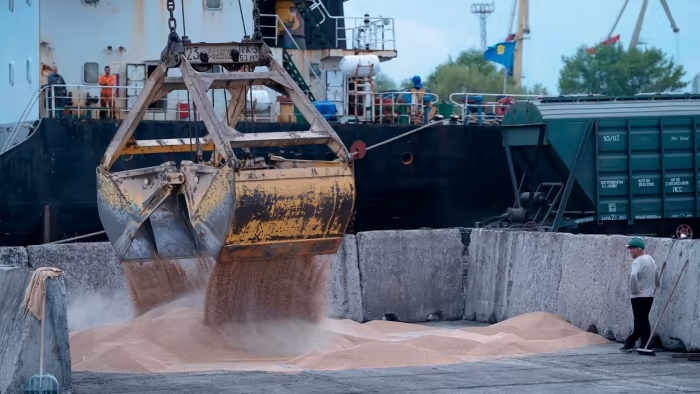Russia announced its decision to pull out from the Black Sea grain deal, arguing that the West did not keep its promises to get Russian agricultural goods to global markets.
"The Black Sea agreements are no longer in effect,” Kremlin spokesman Dmitry Peskov said on Monday. “Unfortunately, the part of the Black Sea agreement that concerns Russia has not yet been fulfilled. As a result, it has been terminated”
The Black Sea Grain Initiative was brokered between Ukraine and Russia by Türkiye and the United Nations (UN) to allow food to be exported during the ongoing war.
Russia has long complained about hurdles in exporting grain and fertilizers. Although there are no direct sanctions against Russian agricultural exports, Moscow argues that other sanctions deter international banks, shipping firms and insurers from doing business with Russian producers.
The Kremlin has set forward a number of requests, including the reinstatement of the Russian Agricultural Bank into the SWIFT global payment system, the restart of farm equipment exports to Russia, and the removal of limitations on insurance and port access for Russian ships and cargo.
Additional demands made by Russia include the resumption of the Togliatti-Odesa ammonia pipeline, which enables the transportation of ammonia to Ukraine's main Black Sea port, and the unblocking of assets and accounts of Russian companies involved in food and fertilizer exports.
Ammonia is a crucial component in fertilizer production, and Moscow insists that Ukraine allow its exports through the port of Odesa.
“As soon as the Russian part (of the deal) is fulfilled, the Russian side will immediately return to the implementation of this deal,” Peskov added.
He made it clear that the decision to withdraw from the landmark grain deal is not related to Ukraine’s claimed strike on the Crimean Bridge.
“These are absolutely unrelated events,” Peskov said. “Even before the terrorist attack, the position was declared by President Putin.”
Russia's Foreign Ministry spokesperson, Maria Zakharova, issued a statement on Monday via her Telegram messaging app, informing that Moscow has officially notified Ankara, Kyiv, and the UN Secretariat that it opposed extending the initiative.
The Black Sea Grain Initiative was brokered by Türkiye and the United Nations (UN) on July 22, 2022. It allowed the resumption of Ukrainian grain exports through the Black Sea ports that were blocked since Russia launched what it called a “special military operation” on February 24, 2022.
Millions of tonnes of grain were trapped in the country’s silos, causing a surge in food prices, as well as fears of a global food crisis.
As part of the deal, Ukraine resumed grain exports through its ports in the Odesa region, while Moscow secured guarantees for its own grain and fertilizer exports.
According to BBC, over the past year, the deal has enabled Ukraine to export over 32 million tonnes of grain and other foods safely across the Black Sea despite the war.
The deal is particularly critical for countries in the Middle East and North Africa region, which rely on Ukrainian wheat and corn imports. Ukraine and Russia are both significant food suppliers, accounting for 29 percent of wheat exports and 80 percent of sunflower exports globally. The exports are mainly through the Black Sea.
Ukraine, often referred to as one of the world's breadbaskets, is a top grain supplier to numerous developing nations. In 2021 alone, the country's grain exports reached $12.2 billion, accounting for nearly a fifth of its total exports.







 Azerbaijan and Armenia started the process of demarcation of their border on Tuesday, with the installation of the first border markers based on ge...
Azerbaijan and Armenia started the process of demarcation of their border on Tuesday, with the installation of the first border markers based on ge...
 Armenian sappers commenced on Monday mine-clearance operations in the territories adjacent to the Saint Mary Church in village of Voskepar (Armenia...
Armenian sappers commenced on Monday mine-clearance operations in the territories adjacent to the Saint Mary Church in village of Voskepar (Armenia...
 Iran and Pakistan have signed eight cooperation documents in various fields, and agreed to strengthen ties to fight terrorism in the region.
Iran and Pakistan have signed eight cooperation documents in various fields, and agreed to strengthen ties to fight terrorism in the region.
 President Aliyev emphasized the critical role of the North-South Transport Corridor in fostering transport cooperation between Azerbaijan and Russi...
President Aliyev emphasized the critical role of the North-South Transport Corridor in fostering transport cooperation between Azerbaijan and Russi...



